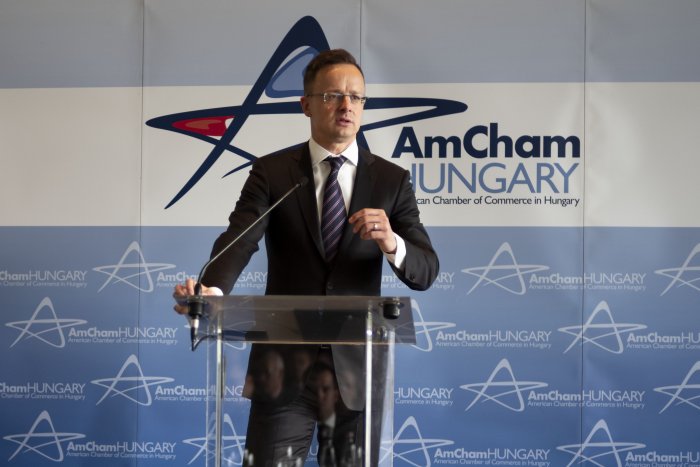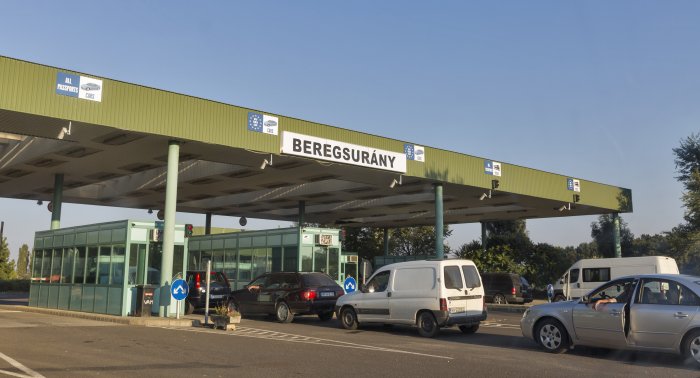Hungary Building a Fairytale With AmCham

Lázár Todoroff/AmCham
Minister of Foreign Affairs and Trade Péter Szijjártó has told AmCham members he continues to rely on their support and suggestions at a business lunch.
Péter Szijjártó
Szijjártó has been a regular visitor to the chamber, and was in a typically upbeat and relaxed mood, calling his audience “my friends” at one point.
The minister was characteristically fast talking, and peppered his speech, largely delivered without reference to notes, with statistics. Old assumptions had been overturned, he insisted. Trade between Germany and the V4 countries (Czech Republic, Hungary, Poland and Slovakia) was 70% more last year than trade between Germany and France.
“Growth rates in this region are much higher than the EU average,” he noted. “We can regard it as an insult when we are told by our Western European friends that we only take.”
That growth is no longer based solely on cheap manufacturing jobs. “The added value, technological level and share of R&D element of the jobs you create is much higher than in recent years.”
Salary Growth
“The average salary paid by you on jobs created while investing in Hungary though HIPA increased by 40% in one year, from HUF 304,000 in 2017 to HUF 425,000 last year.”
For an economy as open as Hungary, success is determined primarily by exports and FDI, he argued.
“Since 2014, export activities have broken national records every year,” he said. That trend continued, with the 2017 record of EUR 100 billion topped in 2018 at EUR 105 bln. FDI was similarly positive. In 2014 HIPA successfully concluded 60 investment projects. Four years later the total was 98 projects. “The pace is still accelerating.”
A new category of cash incentive has been introduced, under which the number of jobs created by a new investment is not the prime consideration, so much as their nature, the idea being to encourage technology-driven investments. The incentive level would be set at 75% of the regional maximum, he said.
During his speech, the minister mentioned the chamber’s latest “Cooperation for a More Competitive Hungary” recommendation package, which had arrived with perfect timing to have elements incorporated into the joint presentation the Hungarian Investment Promotion Agency and the foreign and trade ministry would make to the Competitiveness Council and the cabinet.
“With Róbert [Ésik, president of HIPA], I do not have the intention to reinvent hot water or the wheel. We rely on your ideas and opinions too.”
Contribution Cut
Noting that it was “absolutely a good thing that salaries are growing”, he said the government would cut employer contributions to help the country stay competitive. “Social tax is going to be continuously cut; the next time will be July 1, from 19.5% to 17.5%,” he announced.
The bureaucracy around training subsidies has been eased, he said, and the amount increased from EUR 3,000 to EUR 4,000 per person, and the minimum number of participants reduced from 50 to 25. An agreement with the EU meant R&D subsidies can now be offered in Budapest as well as the rest of the country, with the minimum number of jobs created reduced from 250 to 200.
On the reform of vocational training, the minister said Hungary was looking at “the Austrian model as the benchmark, as it allows much tighter cooperation between companies and school, and opens the possibility of so-called student contracts, meaning those involved in a dual education program can also receive a salary. This will make the dual education system even more popular.”
But Szijjártó was keen to ensure his audience knew he appreciated the contributions their companies have made to Hungary’s growing economy.
“We are very proud, of course, of the [FDI] figures, but without you they would be only a fairytale,” he told members. “That is why I hope for your continued support and trust in the country.”

AmCham’s board meet the foreign minister’s delegation before the lunch.
SUPPORT THE BUDAPEST BUSINESS JOURNAL
Producing journalism that is worthy of the name is a costly business. For 27 years, the publishers, editors and reporters of the Budapest Business Journal have striven to bring you business news that works, information that you can trust, that is factual, accurate and presented without fear or favor.
Newspaper organizations across the globe have struggled to find a business model that allows them to continue to excel, without compromising their ability to perform. Most recently, some have experimented with the idea of involving their most important stakeholders, their readers.
We would like to offer that same opportunity to our readers. We would like to invite you to help us deliver the quality business journalism you require. Hit our Support the BBJ button and you can choose the how much and how often you send us your contributions.








